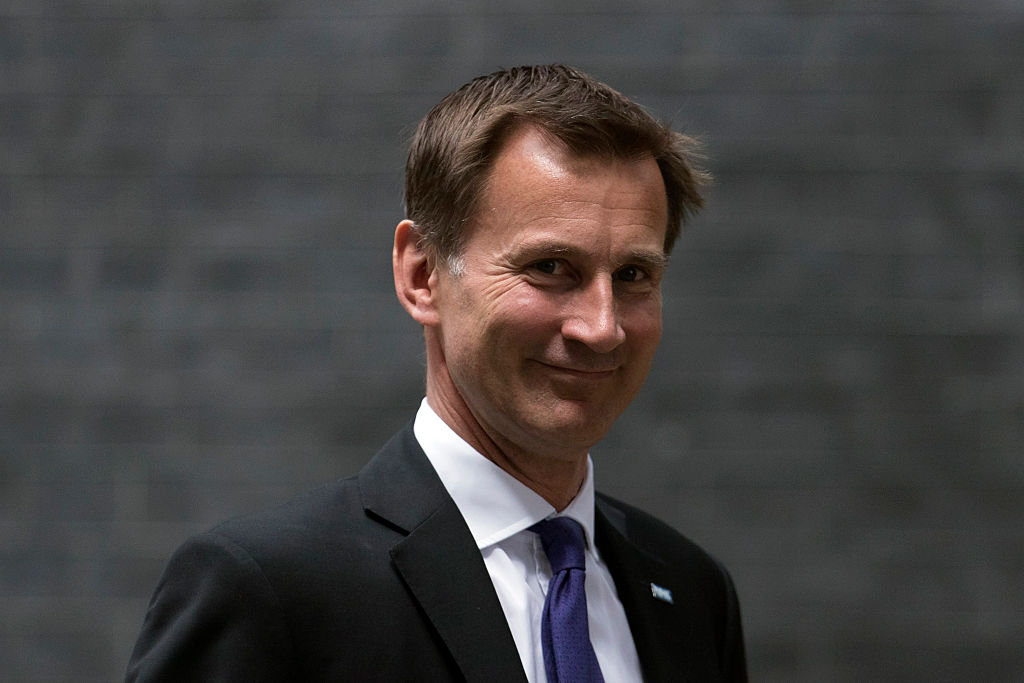Jeremy Hunt is now Britain’s longest-serving health secretary. Having held the post since September 2012, he has been in office for almost six of the 70 years of the NHS that the Government will shortly mark with a major new funding settlement. The occasion seems appropriate for an evaluation of Hunt the politician, as distinct from Hunt the health chief. Because health is a job that tends to consume and define its holder, we don’t hear much about Hunt except as part of the conversation about the NHS, its funding and its performance.
It’s an obvious point today, but reflect on how resilient Hunt has been. Health is a brutal job, especially for Tories. It doesn’t really matter what you do as health secretary, people will be angry with you and accuse you of letting down the NHS, underfunding the NHS or privatising the NHS. Facts, of course, are no defence against such allegations (wait until the “no private provision” mob discover that GPs are private contractors who own their surgeries…). You just have to suck it up, absorb the hatred and keep going.
Hunt may, in the words of a colleague, have the manner of a Blue Peter presenter, but he has become tough, a politician hardened by battle. He took on the BMA, Britain’s most successful and ruthless trade union, over junior doctor contracts and did not back down.
The second trait I’d note is realism. Not least because of the experience of the job, Hunt is clear-eyed about what he can (and cannot) do as health secretary. Though most voters (and an embarrassingly large number of journalists) haven’t noticed, Hunt doesn’t “run the NHS” any more than Gavin Williamson commands the British Army or the chairman of the board runs a public company. By law, that job of running the health service belongs to Simon Stevens, chief executive of what is now, arguably, the world’s biggest quango, NHS England. Without operational power over the service, what’s left for Hunt?
Anyone who has talked to Hunt about his job knows he thinks about the NHS in terms not of operational delivery but culture. Recognising that he can’t run the thing or do much about its structure, he thinks instead about the outlook and attitude of the NHS and its people, embracing the old management guru’s adage that “culture eats strategy for breakfast”. Hence the focus on patient safety and Ofsted-style ratings for hospitals. The latter, he believes, can drive up standards across a service where quality can be inconsistent. That’s tricky territory to navigate, because it involves (tacitly) accepting that in some cases the NHS isn’t as good as it could be, and means challenging its staff to do things differently and better. Neither of those things always goes down well with the large section of the electorate that regards the NHS as sacred and its medical staff as saints.
Some commentators say Hunt has made himself so unpopular at health that he can never hope for higher office. Given the nature of the job and his approach to it, I think it’s slightly surprising that he isn’t more unpopular than he is – and I mean that as a compliment to his political skills.
What next? I assume he wants to be PM, in the way I assume all senior politicians want to be PM. Whether he can persuade the Tories to give him a shot is another matter. As Adrian Wooldridge has noted, there is something anachronistic about Hunt the politician: a posh, rich white man who carries little ideological baggage and wants to talk about what works, he could easily be seen as the continuation of the Blair-Cameron centrism that’s currently very much out of fashion. But that’s about leading a party. Could he be PM? Is he qualified to do the job of chairing Cabinet and overseeing the machinery of government? I think his experience and approach at health suggest he is qualified, and more so than some of the names you find on the list of favourites at the bookies.
In the meantime, he doesn’t want for ways to spend his time: as well as NHS funding he has to deal with social care soon too. But my hope is that he finds the space to venture out of his portfolio a bit and talk about wider political questions. At a time when people on all sides are talking about markets and the role of the state in the economy, I think there are some useful lessons to be drawn from the NHS and its “mixed economy” model of provision. Contributing to any new Tory thinking about markets that emerges from current debate might bolster any future leadership campaign too.
Will he run for the top job when it comes up? I have no idea, though I know several of his colleagues expect him to at least explore the possibility. I’d guess his chances are best if the job comes up under tumultuous circumstances: if Theresa May quits amid a chaotic Brexit failure, Tories might decide serious ministerial experience counts for more than a fresh face. As Tim Shipman revealed in yesterday’s Sunday Times a bad Brexit would be no time for a novice in No 10. And if you can deal with patients dying on trolleys in corridors, lorries backing up at Dover should be manageable.







Comments